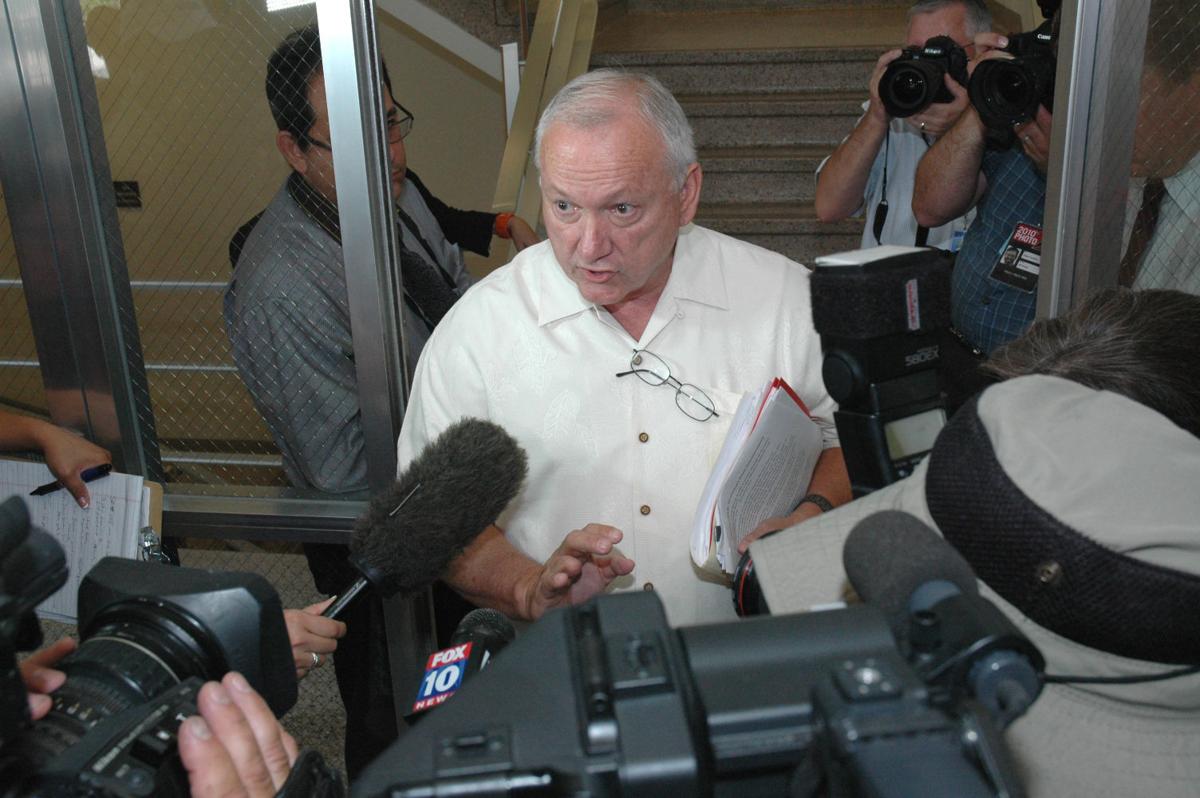PHOENIX — Public officials cannot ban people outright from their buildings even if they have caused a disturbance in the past, a federal appeals court ruled Tuesday.
In a case with constitutional and political implications, the 9th U.S. Circuit Court of Appeals said Latino activist Salvador Reza can pursue his civil suit against former state Senate President Russell Pearce. Reza claims Pearce violated his First Amendment rights by declaring he could not return to the Senate after an alleged disturbance in 2011 during a hearing on immigration legislation.
And that ban extended even to block his ability to meet with other senators.
Pearce, no longer in the Legislature after being recalled by voters in his Mesa district later the same year, lashed out at the 9th Circuit, which over the years has voided many of his measures aimed at illegal immigration.
“The circuit court has contempt for the law, it has contempt for the Constitution, they have contempt for citizens,” he said Tuesday. “Anything they do should not surprise anybody.”
Pearce also said his actions were proper, with the Arizona Constitution giving him the power to set the rules for the Senate.
But Judge Milan Smith Jr., writing for the majority in the split decision, said the question of whether Reza was being disruptive is a disputed fact, something a jury should decide. Smith said even if Reza had been disruptive, there was no constitutional justification for a ban.
“No cases, in the 9th Circuit or otherwise, empowered a government official to completely ban an individual from a government meeting based on a single disruption of a hearing,” Smith wrote.
“The effect of the ban was thus to exclude Reza not simply from all future hearings related to SB 1070, but from all future hearings on any subject,” the judge wrote. “In addition, because the building housed the legislative officers of all members of the Arizona Senate, the ban precluded Reza from visiting his elected representatives to urge legislative action on any subject.”
It was that ban that resulted in Reza being arrested when he attempted to go to an appointment he had with another senator.
The lawsuit stems from a 2011 hearing on immigration legislation. That measure was a follow-up to the prior year’s SB 1070, the controversial measure crafted by Pearce to give state and local police more power to detain those not in the country legally.
With the small hearing room filled, most were shunted off to an overflow room to watch on closed-circuit TV.
There, some members of the audience, which reached close to 300 according to estimates, cheered and clapped while watching, conduct not normally permitted in hearing rooms where live testimony is taking place. Security staffers warned Reza and others that the noise was being disruptive.
According to police reports, Pearce, who was not at the hearing but in his office, told security officers to identify the leaders and deny them future entrance into the Senate. One of those was Reza.
Several days later, Reza returned to the Senate to meet with Sen. Steve Gallardo, D-Phoenix.
A Department of Public Safety officer who served at the time as chief of Senate security wrote in his report that he read Reza a statement telling him he was no longer allowed inside the Senate.
When Reza refused to leave, he was arrested and booked on charges of trespass and held at the county jail for about five hours.
The County Attorney’s Office never prosecuted Reza or a female companion who was arrested at the same time. While the ban was subsequently lifted, Reza sued.
Pearce said he enacted the ban out of concern for public safety. He cited the fatal shooting the prior month of Congresswoman Gabrielle Giffords and others in Tucson, as well at protests earlier that same day at a speech by a state senator.
Under the rules, first-time violators were excluded from the Senate for two weeks; subsequent violations would mean a 60-day ban.
“We are not persuaded by the senator’s public safety rationale for his restrictions on Reza,” Smith wrote.
The judge said such concerns “must be supported by the record.” And he said Pearce’s rationale fell short.
“We are required to infer that Reza was a threat based only on the tense environment that existed in Arizona at the time of the protest,” Smith wrote. “That is not enough, especially given that Sen. Pearce took an extreme action, barring Reza from the Senate building completely.”
Tuesday’s ruling was not unanimous, with appellate Judge Clifford Wallace saying he viewed Pearce’s action as reasonable.





